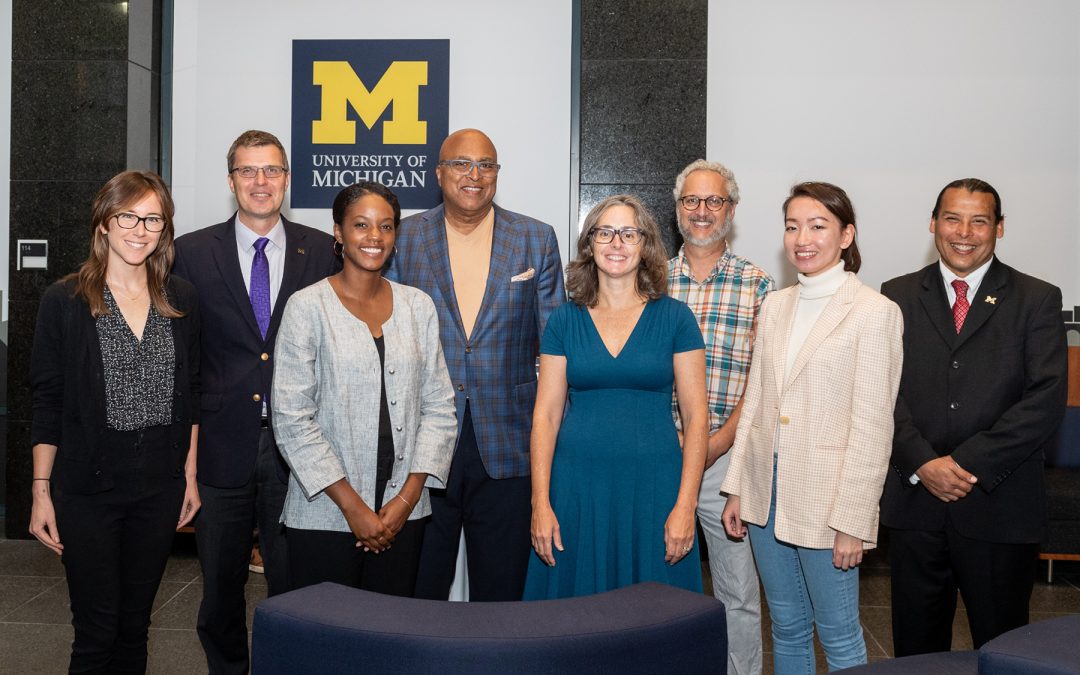On Thursday, September 12, friends of Rackham gathered at the U-M Detroit Center to hear from Dean Mike Solomon about his vision for the future of graduate education, and to learn how Rackham students and alumni are making a positive difference in the city.
Dean Solomon briefly shared his ideas for a student-centered and faculty-led graduate experience, including a critical look at the apprenticeship model of scholarly training. He discussed how Rackham aims to tackle challenges facing academia today, including the shortage of jobs in the professoriate, increased public skepticism of evidence-based research, and concerns around graduate-student mental-health.
Assistant Dean Ethriam Brammer moderated a panel of graduate students and alumni who shared with the audience the ways in which they have used their education to positively impact Detroit communities. Panelists represented a variety of career paths and experiences and included the following Rackham alumni and students:
Michael Appel, M.A., Anthropology, 1988
Senior Project Manager, Develop Detroit
Appel has spent more than 30 years working on affordable housing, previously in a variety of roles with Avalon Housing. Now, he serves as a senior project manager at Develop Detroit as he works to do his part in the revitalization of Detroit neighborhoods through affordable housing development. Appel, with a background in social work and anthropology emphasizes the importance of interdisciplinary work in the pursuit of a career like his. “Academic disciplines have these artificial borders, but outside of academia, reality doesn’t care about those borders, and people have to work across those imaginary boundaries.”
Lindsey Barrett, M.P.P., Public Policy, 2019
Program and Impact Fellow, The Skillman Foundation
A lifelong Detroiter, Barrett spoke of the resilience and passion which characterize the city’s residents. “They are energized by how quickly the landscape is changing, and they’re showing up ready to have a say. There is a level of lived experience and expertise in the people who live here, and they can help us learn.” She also noted the ways in which Rackham has helped to prepare her for this work. “I was making a pretty big career shift from education to public policy, and the flexibility in curriculum, taking classes across departments… it showed me what was possible in a global context.” Barrett currently serves as a program and impact fellow for The Skillman Foundation, which aims to create opportunities and help the children of Detroit thrive.
Sharon Dolente, M.P.P., Public Policy and J.D. ‘04
Voting Rights Strategist, ACLU of Michigan
Dolente led the creation of Proposal 3, which appeared on Michigan ballots in the 2018 election. A process of more than a decade, Prop 3 aimed to reform Michigan’s voting laws by implementing straight-ticket voting, automatic and same-day voter registration, and no-excuse absentee voting. The most aggressive proposal for voting rights in Michigan’s recent history, Prop 3 was the culmination of the ongoing efforts meant to make voting easier and more accessible to people who otherwise may struggle to get to the polls. “I learned early on that when laws don’t work for everyone, you must change them until they do,” Dolente said. She added that there is no one solution to the issues facing Detroiters, but when we realize these issues are all interconnected, important work can be achieved.
Alexa Eisenberg, Ph.D. Candidate
School of Public Health
When Eisenberg isn’t working on her dissertation project, she works with the Poverty Solutions initiative here at U-M and collaborates on projects with the United Community Housing Coalition (UCHC). The UCHC works to prevent foreclosure and eviction, and to find solutions for people experiencing homelessness in Detroit. There, she helps to evaluate programs and policies with the end goal of preventing tax foreclosures. Eisenberg notes Rackham’s role in her ability to do this work. As a grant recipient in the Rackham Program in Public Scholarship, she was able to create tools and training materials for community-based organizations. She has continued to conduct research on the consequences of tax foreclosure on health equity and well-being.
Yuanqiu Feng, Ph.D. Candidate
Resources Policy and Behavior, School of Environment and Sustainability
With a background in architecture, Feng focuses on the social and aesthetic impact of the urban stormwater management system. Originally from Singapore, she notes, “I didn’t think I would be doing this work in Detroit, I thought I would go back and work in Asia, but the close collaboration with the Detroit community was incredible.” Feng also acknowledged the Barbour Scholarship, provided by Rackham, as being integral to her ability to conduct this work outside of her dissertation project. “It is very difficult for international students to find funding, but I have been able to focus on this research for a whole year without having to take on other responsibilities.” Rackham also supported Feng during one of her annual trips back to the informal settlement she once helped establish in Southeast Asia.
W. David Tarver, M.S.E., Electrical Engineering 1976
Lecturer, U-M Center for Entrepreneurship and College of Engineering
President, Urban Entrepreneurship Initiative
A native of Flint, Michigan, Tarver recalls growing up in a thriving city with endless possibilities. He grew up learning about science, but always knew he wanted to start a business. After establishing and later selling his own company manufacturing telecommunications test equipment—now used by every major wireless company in the world—he finds himself encouraging young entrepreneurs in urban areas to do the same. As a lecturer in U-M’s Center for Entrepreneurship, Tarver’s Urban Entrepreneurship course teaches students the importance of not only building businesses in urban areas, but improving the lives of those who live there. Students partner with Detroit entrepreneurs to bring their technical resources to the table in order to learn and ultimately help solve a problem.
Those in attendance were pleased to hear not only about the panelists’ critical work, but also their thoughtfulness in creating an equitable and sustainable impact for the residents of Detroit. Rackham alumna and donor, Dr. Melba Boyd, said it simply: “As a Wolverine, you make me feel good.”

